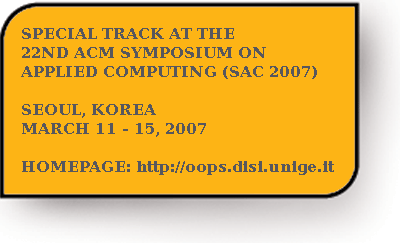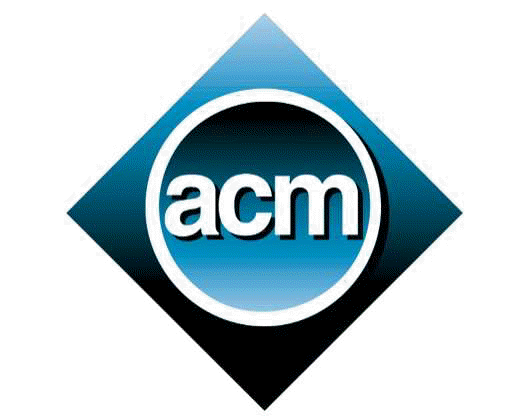

OBJECT-
ORIENTED
PROGRAMMING
LANGUAGES AND
SYSTEMS
ACCEPTED PAPERS
The list is now available.
SAC 2007
For the past twenty-one years, the ACM Symposium on Applied Computing (SAC) has been a primary gathering forum for applied computer scientists, computer engineers, software engineers, and application developers from around the world.
SAC 2007 is sponsored by the ACM Special Interest Group on Applied Computing (SIGAPP), and is hosted by Seoul National University in Seoul and The Suwon University in Gyeonggi-do.
OOPS TRACK: AIMS AND TOPICS
Today's large scale software systems are typically
designed and implemented using the concepts of the object-oriented (OO)
paradigm.
However, there is still a need for existing OO languages and
architectures to continuously adapt in response to demands for new
features and innovative approaches.
These new features, to name a few, include unanticipated software
evolution, security, safety, distribution, and interoperability.
The basic aim of the OOPS track at the SAC 2007 is to promote and
stimulate further research on the object-oriented programming and
distributed-object paradigms.
This track will foster the development of extensions and enhancements
to the prevalent OO languages, such as Java, C# and C++, the
formulation of innovative OO-based middleware approaches, and the
improvements to existing and well-established distributed-object based
systems.
Specifically, this track will invite papers investigating the
applicability of new ideas to widespread, and standard object-oriented
languages and distributed-object architectures.
A medium to long-term vision is also solicited, tackling general issues
about the current and future role of prevalent OO languages and
distributed architectures in Computer Science and Engineering.
Particularly of interest for this track are those papers that provide a
thorough analysis covering following aspects: theory, design,
implementation, applicability, performance evaluation, and
comparison/integration with existing constructs and mechanisms.
Original papers and implementation reports are invited from all areas
of OO programming languages and distributed-object computing.
The specific topics of interest for the OOPS track include, but are not
limited to, the following:
> Programming abstractions
> Advanced type mechanisms and type safety
> Multi-paradigm features
> Language features in support of open systems
> Aspect-oriented and component-based programming
> Reflection, meta-programming
> Program structuring, modularity, generative
programming
> Compositional languages
> Distributed objects and concurrency
> Middleware
> Heterogeneity and interoperability
> Applications of distributed object computing

TRACK CHAIRS
> Davide
Ancona
DISI, Università di Genova,
Italy
davide@disi.unige.it
> Mirko
Viroli
DEIS Università di Bologna,
Italy
mviroli@deis.unibo.it
PROGRAM COMMITTEE
> Shigeru Chiba, Tokyo Institute of Technology, Japan
> Alessandro Coglio, Kestrel Institute, USA
> Pascal Costanza, Vrije Universiteit Brussel, Belgium
> Ferruccio Damiani, Università di Torino, Italy
> Erik Ernst, DAIMI, Denmark
> Geoffrey Fox, Indiana University, USA
> Jacques Garrigue, Nagoya University, Japan
> Jeffrey Gray, University of Alabama at Birmingham, USA
> Tom Hirschowitz, ENS Lyon, France
> Atsushi Igarashi, Kyoto University, Japan
> Doug Lea, Suny Oswego, USA
> Giovanni Lagorio, Università di Genova, Italy
> Francesco Logozzo, École Polytechnique, France
> Hidehiko Masuhara, University of Tokyo, Japan
> Tamiya Onodera, IBM Tokyo Research Laboratory, Japan
> Julian Rathke, University of Sussex, UK
> Giovanni Rimassa, Whitestein Technologies, Switzerland
> Don Syme, Microsoft Research, UK
> Tetsuo Tamai, University of Tokyo, Japan
SUBMISSION INSTRUCTIONS
All papers should represent original and previously unpublished works that are currently not under review in any conference or journal. Both basic and applied research papers are welcome.
Electronic submission in PDF format is required at the
following page.
Please, contact Jeff Allen (jallen@cs.iupui.edu) for any problems with
the conference management system. Hardcopy and fax submissions will
not be accepted.
The author(s) name(s) and address(es) must not appear in the body of the paper, and self-reference should be in the third person. This is to facilitate a blind review process.
The preferred format for the submission is the ACM SIG Proceedings Template (available through http://www.acm.org/sigs/pubs/proceed/template.html). The body of the paper should not exceed 5,000 words (5 pages according to the above style). Papers that fail to comply with length limitations risk rejection.
All papers must be submitted by September 8, 2006.
Submission of the same paper to multiple tracks is not allowed.
PROCEEDINGS
AND SPECIAL ISSUE
Accepted full papers will be published by ACM in the annual conference
proceedings, with the option (at additional expense) to add 3 more
pages. Accepted poster papers will be published as extended 2-page
abstracts in the same proceedings.
Please note that full registration is required for paper and poster inclusion in the conference proceedings and CD. Student registration does not cover paper and poster inclusion in the conference proceedings, but it is only intended to encourage student attendance.
Finally, as it is customary, after the conference the
accepted full papers will be selected for publication on a special
issue.
IMPORTANT DATES
September 8, 2006: Paper Submission
October
16, 2006: Author Notification
October 30, 2006:
Camera-Ready Copy
December 5, 2006: SIGAPP Travel Awards Applications
March 11--15, 2007: SAC 2007